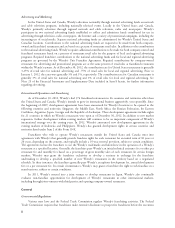Wendy's 2012 Annual Report Download - page 19
Download and view the complete annual report
Please find page 19 of the 2012 Wendy's annual report below. You can navigate through the pages in the report by either clicking on the pages listed below, or by using the keyword search tool below to find specific information within the annual report.material) would equal Wendy’s proportionate share of the unfunded vested benefits based on the year in which the
liability is triggered. A withdrawal liability would be triggered if Wendy’s (1) ceases to make contributions to the
Union Pension Fund, (2) closes its bakery facility, or (3) decides not to renew the collective bargaining agreement. No
factors for which the Bakery would incur a withdrawal liability occurred during fiscal 2012. A future incurrence of
withdrawal liability could have a material effect on the Company’s results of operations.
Complaints or litigation may hurt the Wendy’s brand.
Wendy’s customers file complaints or lawsuits against us alleging that we are responsible for an illness or injury
they suffered at or after a visit to a Wendy’s restaurant, or alleging that there was a problem with food quality or
operations at a Wendy’s restaurant. We are also subject to a variety of other claims arising in the ordinary course of
our business, including personal injury claims, contract claims, claims from franchisees (which tend to increase when
franchisees experience declining sales and profitability) and claims alleging violations of federal and state law regarding
workplace and employment matters, discrimination and similar matters, including class action lawsuits related to
these matters. Regardless of whether any claims against us are valid or whether we are found to be liable, claims may
be expensive to defend and may divert management’s attention away from operations and hurt our performance. We
cannot estimate the aggregate possible range of loss due to most proceedings being in preliminary stages, with various
motions either yet to be submitted or pending, discovery yet to occur, and significant factual matters unresolved. In
addition, most cases seek an indeterminate amount of damages and many involve multiple parties. Predicting the
outcomes of settlement discussions or judicial or arbitral decisions are thus inherently difficult. A judgment
significantly in excess of our insurance coverage for any claims could materially adversely affect our financial condition
or results of operations. Further, adverse publicity resulting from these claims may hurt us and our franchisees.
Additionally, the restaurant industry has been subject to a number of claims that the menus and actions of
restaurant chains have led to the obesity of certain of their customers. Adverse publicity resulting from these
allegations may harm the reputation of our restaurants, even if the allegations are not directed against our restaurants
or are not valid, and even if we are not found liable or the concerns relate only to a single restaurant or a limited
number of restaurants. Moreover, complaints, litigation or adverse publicity experienced by one or more of Wendy’s
franchisees could also hurt our business as a whole.
We may not be able to adequately protect our intellectual property, which could harm the value of the Wendy’s
brand and hurt our business.
Our intellectual property is material to the conduct of our business. We rely on a combination of trademarks,
copyrights, service marks, trade secrets and similar intellectual property rights to protect our brand and other
intellectual property. The success of our business strategy depends, in part, on our continued ability to use our
existing trademarks and service marks in order to increase brand awareness and further develop our branded products
in both existing and new markets. If our efforts to protect our intellectual property are not adequate, or if any third
party misappropriates or infringes on our intellectual property, either in print or on the Internet, the value of our
brand may be harmed, which could have a material adverse effect on our business, including the failure of our brand
to achieve and maintain market acceptance. This could harm our image, brand or competitive position and, if we
commence litigation to enforce our rights, cause us to incur significant legal fees.
We franchise our brand to various franchisees. While we try to ensure that the quality of our brand is
maintained by all of our franchisees, we cannot assure you that these franchisees will not take actions that hurt the
value of our intellectual property or the reputation of the Wendy’s restaurant system.
We have registered certain trademarks and have other trademark registrations pending in the United States and
certain foreign jurisdictions. The trademarks that we currently use have not been registered in all of the countries
outside of the United States in which we do business or may do business in the future and may never be registered in
all of these countries. We cannot assure you that all of the steps we have taken to protect our intellectual property in
the United States and foreign countries will be adequate. The laws of some foreign countries do not protect
intellectual property rights to the same extent as the laws of the United States.
In addition, we cannot assure you that third parties will not claim infringement by us in the future. Any such
claim, whether or not it has merit, could be time-consuming, result in costly litigation, cause delays in introducing
16
























